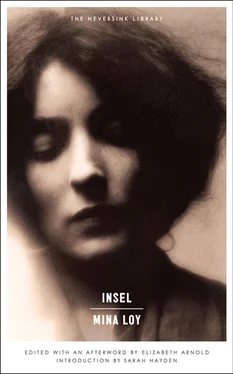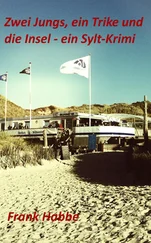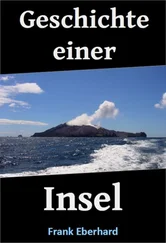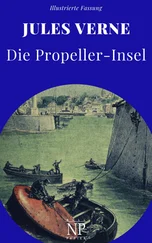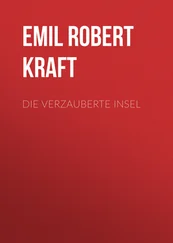“So he tells you that one, too?”
“Look here,” I confessed. “At first I was indignant with you for launching the opinion that Insel is mad—. Now I am not sure—. It occurs to me that I can’t even make out what sanity is.”
“Well, I find him such an awful bore, I am constantly having to turn him out—”
“That’s because he’s too surrealistic for the surrealists.”
But when Mlle Alpha spoke of his work, it was with a profound veneration I could hardly share.
“I’m not so fond of elementals — I find that strata in the subliminal thin—. I know his work is a technical miracle and I submit to the active hypnosis with which he has the power to infuse dead paint — still—. There! That’s one thing we’re always talking about. His future work. He shows me what he is going to do. Sometimes I feel he has found a short cut to consummation in defiance of the concrete. That he is filling the galleries of the increate. He seemed so worth helping, I’ve only just begun to notice he never paints. If he ever does paint the things he sees — God knows where —the result will be spectacular.”
“Why? Haven’t you heard about Insel?” asked Mlle Alpha. “He and the friend with whom he came to Paris took morphine together and two years ago this friend died. His death gave Insel such a jolt, he dropped the drug, and ever since has painted nothing of any account.
“Why on earth doesn’t he take his old morphine?” she demanded of the universe in general, “and let himself die? At least he would have painted his pictures — while this way — where is the good in his remaining alive?”
Now drugs meant nothing to me. I had supposed they were a substitute for imagination in the unimaginative. I was prejudiced against the stories afloat of their awful destructiveness, ascribing them to one of those official dodges for preventing an exasperated humanity from having a little fun. Subconsciously, I waived this information. As if my mind were a jury refusing to be influenced by extraneous evidence. Being thus luckily prevented from putting two and two together, I was free to pursue my investigation of Insel in my own reactive way.
Moreover, was not Insel’s morphinism a thing of the past?
BEFORE I LEFT MLLE ALPHA TOLD ME THAT STIFF Ussif, the surrealist, had painted a picture I ought to see. Remembering (that under the influence of his feline screech) I had made no appointment with my strange boon companion, I arranged to go to Ussif’s the following week on my return to town.
“By the way”— I exclaimed, “I forgot—. When Insel wrote to you — did he predict the day and hour when his resistance must give out—?”
“Nothing of the kind,” she answered. “He wrote as usual, ‘I am starving to death.’ ”
When the time came for me to return I arrived to find a telephone message from the dressmaker, who was ill. So I hurried off to do some shopping. Afterwards, on my way to the surealist’s studio, I stopped the taxi at my flat to change my gloves.
As I ran up the one flight of stairs, I had to slow down. Surprisingly, on this warm day, an iciness was creeping up my ankles. I proceeded into a chill draught.
“Insel!” I realized.
There was nobody standing at my front door.
Although well lit by a staircase window, it was hung with a square curtain of black mist.
Slowly, this mist put forth an abstract sign of concavity, and still more slowly, a transparent diagram of my friend grew on to it.
Hunching into materialization, as a dead man who should vomit himself back to life, Insel, whose illness was dissolution, moaned to me in the voice of a wraith.
“I thought you would never come.”
When I got him inside, we were already laughing — half apologetically — as if we found it absurd, this meeting in no man’s land without explanations to offer.
“Why didn’t you say you were coming?”
“But I thought — surely—” with an anguished grin, “Friday is my ‘little afternoon.’ ”
“Of course it’s your little afternoon, Insel,” I laughed. “Only when you have turned the lady down is just when you have to specify the hour of your return; if she is to expect you — I’ve got an engagement.”
“My little afternoon,” he raved, collapsing, “I was going to take you to my room to see my picture.”
WHAT AM I TO DO WITH YOU? THE TAXI METER IS ticking, the surrealist’s waiting. Pull yourself together — quick! I’ll take you along.
“However did you get that hole in your trousers, it’s new—” I demanded, detecting, as we got into the taxi, a perfect round of perforation letting out a tiny light from his thigh. I suspected him of replenishing his beggar’s capital.
“It was there before,” said Insel sanctimoniously, as if referring to a halo earned by excessive martyrdom.
“You might as well come up and see Ussif with me,” I suggested.
“No,” said Insel, “none of the surrealists will have anything to do with me. They know only too well, if they did, I should try to borrow money.”
“I should have thought you’d be worth a little money to a surrealist. He might learn what supereality is about — you are organically surreal—”
“I don’t do it on purpose,” said Insel dejected.
“I know you don’t,” I assured him warmly. “You only ‘do’ Kafka on purpose — you’re so much better in the original.”
I kept my promise of going to his room on my way back. Strangely — the very name of the street he lived in had the sound of a ghostly exhaustion. His attic was on the seventh story.
Along the narrow open passage with its bare iron railing the Chambres de Bonnes moved past me as I looked for his name on the doors, when, coming to a closed iron shutter fleeced with dust and cobwebs growing in patches like a moss of soot or hanging in gray festoons about its slits, I felt the liveness of the air decrease, and “Insel” written in the archaic hand of some automatic writings drew up my eyes—. To that darkened crack which outlines the magical versatility of a barrier measuring a yard across and with merely the touch of a hand diminishing to a strip three inches wide. That cover of a living book whose history may come to an end before you can get it open; or cut short your personal adventure by remaining shut; out of this oblong outline of Entrance and Exit there leaked a perceptible seepage of Insel’s torpor.
Noiselessly, indolently, the door vanished. I walked into its chasm and Insel led me to his painting set in the pacific light of a large attic window.
“Das ist die Irma?” he said with the secretive in-looking twinkle that lit up his eyes with recurrent delights. And suddenly it dawned upon me that one thing about this man that made him so different to other people was that contrary to our outrunning holding-up-the-mirror self-consciousness, his was constantly turning its back on the world and tiptoe with expectancy, peeping inquisitively into its own mischievous eyes. Or, in some cerebral acrobatic recoil, that being who is, in us, both outlooker and window, in him, astonishingly, was craning back to look in at the out looking window of himself, as if there were something there he might forget, some treasure as to whose existence he wished to remain assured, some lovely illusion inside him, he must re-see to insure its continued projection.
“ Die Irma ,” he repeated lovingly to introduce her to me, and the magnetic bond uniting her painted body to his emaciated stature — as if she were of an ectoplasm proceeding from him — was so apparent one felt as if one were surprising an insane liaison at almost too intimate a moment. He was glittering with a pleasure as dynamically compressed as the carbon of a diamond.
Читать дальше
